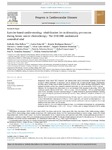Mostrar o rexistro simple do ítem
Exercise-based cardio-oncology rehabilitation for cardiotoxicity prevention during breast cancer chemotherapy: the ONCORE randomized controlled trial
| dc.contributor.author | Díaz-Balboa, Estíbaliz | |
| dc.contributor.author | Peña-Gil, Carlos | |
| dc.contributor.author | Rodríguez-Romero, Beatriz | |
| dc.contributor.author | Cuesta-Vargas, Antonio I. | |
| dc.contributor.author | Lado-Baleato, Oscar | |
| dc.contributor.author | Martínez-Monzonís, Amparo | |
| dc.contributor.author | Pedreira-Pérez, Milagros | |
| dc.contributor.author | Palacios-Ozores, Patricia | |
| dc.contributor.author | López-López, Rafael | |
| dc.contributor.author | González-Juataney, José R. | |
| dc.contributor.author | González-Salvado, Violeta | |
| dc.date.accessioned | 2024-03-06T07:48:37Z | |
| dc.date.available | 2024-03-06T07:48:37Z | |
| dc.date.issued | 2024-02-21 | |
| dc.identifier.citation | Díaz-Balboa E, Peña-Gil C, Rodríguez-Romero B, Cuesta-Vargas AI, Lado-Baleato O, Martínez-Monzonís A, Pedreira-Pérez M, Palacios-Ozores P, López-López R, González-Juanatey JR, González-Salvado V. Exercise-based cardio-oncology rehabilitation for cardiotoxicity prevention during breast cancer chemotherapy: the ONCORE randomized controlled trial. Prog Cardiovasc Dis. 2024 Feb 21:S0033-0620(24)00023-9. | es_ES |
| dc.identifier.issn | 0033-0620 | |
| dc.identifier.uri | http://hdl.handle.net/2183/35800 | |
| dc.description.abstract | [Abstract] Background: Breast cancer (BC) treatment with anthracyclines and/or anti-human epidermal growth factor receptor-2 (HER2) antibodies is associated with an increased risk of cardiovascular disease complications, including cancer therapy-related cardiac dysfunction (CTRCD). While Cardio-Oncology Rehabilitation (CORe) programs including exercise have emerged to minimize these risks, its role in preventing CTRCD is unclear. Objectives: We investigated the effectiveness of an exercise-based CORe program in preventing CTRCD [left ventricular ejection fraction (LVEF) drop ≥10% to a value <53% or a decrease >15% in global longitudinal strain (GLS)]. Secondary outcomes examined changes in cardiac biomarkers, physical performance including peak oxygen consumption, psychometric and lifestyle outcomes. Safety, adherence, and patient satisfaction were also assessed. Methods: This is a randomized controlled trial including 122 early-stage BC women receiving anthracyclines and/or anti-HER2 antibodies, randomized to CORe (n = 60) or usual care with exercise recommendation (n = 62). Comprehensive assessments were performed at baseline and after cardiotoxic treatment completion. The average duration of the intervention was 5.8 months. Results: No cases of CTRCD were identified during the study. LVEF decreased in both groups, but was significantly attenuated in the CORe group [-1.5% (-2.9, -0.1); p = 0.006], with no changes detected in GLS or cardiac biomarkers. The CORe intervention led to significant body mass index (BMI) reduction (p = 0.037), especially in obese patients [3.1 kg/m2 (1.3, 4.8)]. Physical performance and quality-of-life remained stable, while physical activity level increased in both groups. No adverse events were detected. Conclusions: This study suggests that CORe programs are safe and may help attenuate LVEF decline in BC women receiving cardiotoxic therapy and reduce BMI in obese patients. | es_ES |
| dc.description.sponsorship | This work was supported by a competitive grant from the Spanish Association Against Cancer Scientific Foundation (grant number PRDLC21480DÍAZ) and a competitive grant from the Spanish Health Research Fund of the Carlos III Health Institute (grant number PI17/01687), co-funded by FEDER, through Strategic Action in Healthcare, 2017. Funding for open access charge will be supported by Universidade da Coruña/CISUG. None of the funding sources were involved in the study design, data collection, data analysis, data interpretation or report writing. | es_ES |
| dc.description.sponsorship | Asociación Española contra el Cáncer; PRDLC21480DÍAZ | es_ES |
| dc.description.sponsorship | info:eu-repo/grantAgreement/ISCIII/Programa Estatal de Fomento de la Investigación Científica y Técnica de Excelencia/PI17%2F01687/PROGRAMAS INTEGRADOS DE REHABILITACION CARDIACA CON EJERCICIO FISICO EN LA PREVENCION DE LA TOXICIDAD CARDIOVASCULAR MEDIADA POR ANTRACICLINAS Y/O ANTICUERPOS ANTI-HER-2. ESTUDIO ONCORE | es_ES |
| dc.language.iso | eng | es_ES |
| dc.publisher | Elsevier | es_ES |
| dc.relation.uri | https://doi.org/10.1016/j.pcad.2024.02.002 | es_ES |
| dc.rights | Creative Commons Attribution-NonCommercial-NoDerivs 4.0 International Licence (CC BY-NC-ND 4.0) | es_ES |
| dc.rights.uri | https://creativecommons.org/licenses/by-nc-nd/4.0/ | |
| dc.subject | Breast cancer | es_ES |
| dc.subject | Cardio-oncology rehabilitation | es_ES |
| dc.subject | Cardiotoxicity | es_ES |
| dc.subject | Cardiovascular prevention | es_ES |
| dc.subject | Exercise | es_ES |
| dc.title | Exercise-based cardio-oncology rehabilitation for cardiotoxicity prevention during breast cancer chemotherapy: the ONCORE randomized controlled trial | es_ES |
| dc.type | info:eu-repo/semantics/article | es_ES |
| dc.rights.access | info:eu-repo/semantics/openAccess | es_ES |
| UDC.journalTitle | Progress in Cardiovascular Diseases | es_ES |
Ficheiros no ítem
Este ítem aparece na(s) seguinte(s) colección(s)
-
GI-IPRF - Artigos [140]








